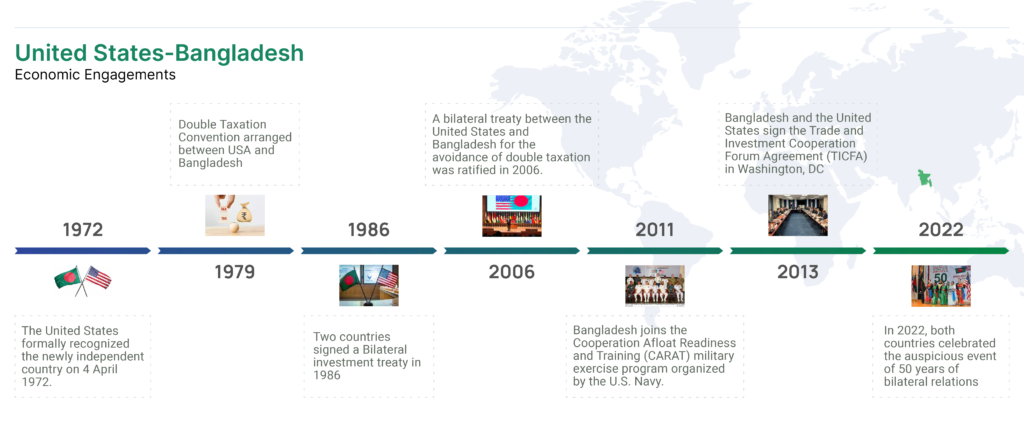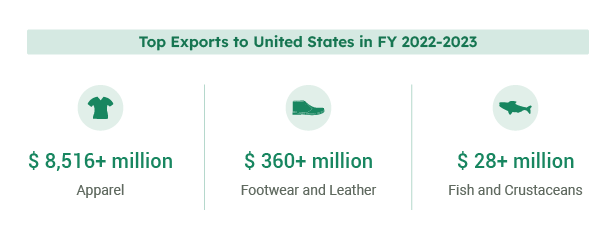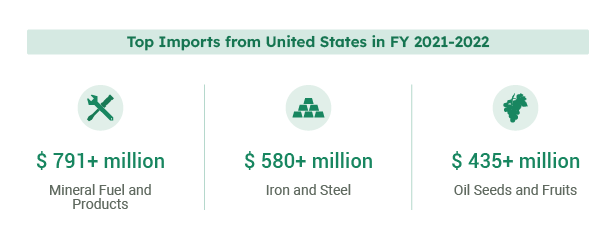Bangladesh holds a significant role as a crucial regional ally across economic, climate, humanitarian, and security domains. The United States officially acknowledged the newly established nation on April 4, 1972.
As 2022 commemorated the 50th anniversary of U.S.-Bangladesh relations, both nations engaged in numerous high-level interactions and strategic conversations in Dhaka and Washington, D.C. These exchanges aimed to foster deeper cooperation spanning bilateral, economic, commercial, and security realms.
Moreover, Bangladesh’s remarkable growth trajectory and its willingness to welcome U.S. private sector investments have positioned it as an alluring market for American companies as well. Chevron’s extensive operations stand out as a prime example of American investment in the country, accounting for 50% of Bangladesh’s natural gas production.

In the year 2022, the net inflow of Foreign Direct Investment (FDI) settled at $354.19 Million, with the gas and petroleum sector securing the most substantial allocation of $220.39 Million. Moreover, the banking and insurance sectors ($35.53 Million), alongside RMG and textile ($56.00 Million), are among the other notable beneficiaries of assistance from the United States. Additionally, the US accounted for 20.2% of total equity capital investment in the FY 2021-2022.
Notably, U.S. enterprises also make notable contributions to Bangladesh’s transportation and infrastructure domains by supplying top-tier aircraft, locomotives, power generation turbines, dredging equipment, and other significant products.

In the year 2022, Bangladesh’s exports to the United States totaled around $5,882.84 Million, while its imports from the United States amounted to approximately $2,251 Million. Key American exports to Bangladesh encompass agricultural items such as soybeans, cotton, wheat, and dairy products, as well as aircraft, machinery, engines, and iron and steel products. On the other hand, products imported from Bangladesh to the United States include apparel, footwear, textiles, toys, games, sporting goods, shrimp, prawns, and various agricultural goods.
Furthermore, in the realm of service sector exports, the United States stands as the largest destination for Bangladesh’s Information and Communication Technology (ICT) industry, accounting for 34 percent of the country’s ICT exports.


This collaboration is additionally bolstered by the Government of Bangladesh’s (GoB) implementation of progressive policies pertaining to investments and business operations. The inception of the Bilateral Investment Treaty (BIT) program in 1981 serves the purpose of fostering and safeguarding U.S. investments in emerging economies. This treaty plays a significant role in motivating Bangladesh and other administrations to adopt macroeconomic and structural measures conducive to fostering economic expansion.
The underpinning principle of this policy asserts that an open global investment framework, driven by market dynamics, offers the optimal and most effective means of advancing worldwide economic development.
Furthermore, in 2004, a bilateral agreement was entered into by the United States and Bangladesh to prevent double taxation. The United States officially approved and accepted this agreement on March 31, 2006.
Contact us for a comprehensive understanding of the investment landscape in Bangladesh